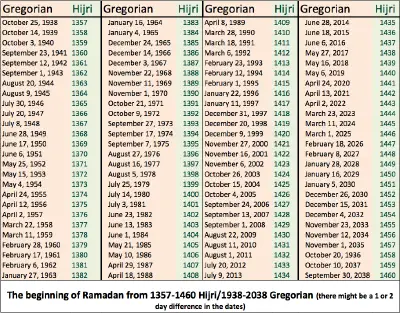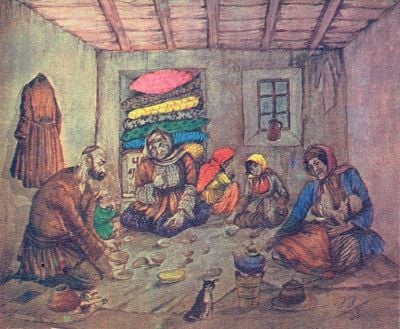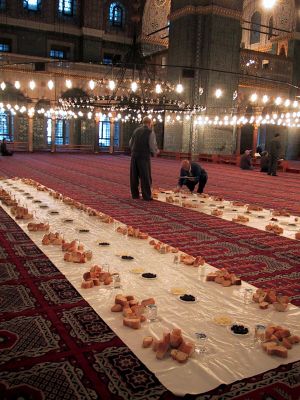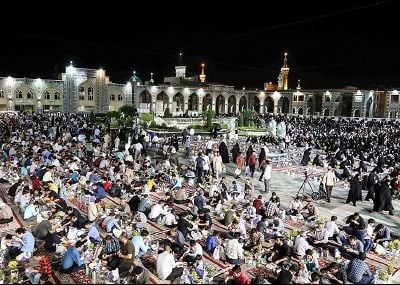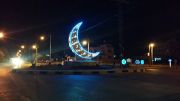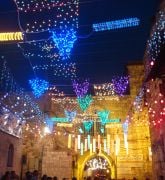| Ramadan رَمَضَان | |
|---|---|
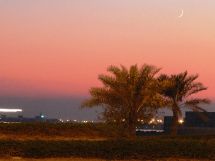
| |
| A crescent moon can be seen over palm trees at Manama, marking the beginning of the Islamic month of Ramadan in Bahrain. | |
| Also called | *Azerbaijani: Ramazan
|
| Observed by | Muslims |
| Type | Religious |
| Begins | At the last night of the month of Sha'ban[1] |
| Ends | At the last night of the month of Ramadan[1] |
| Date | Variable (follows the Islamic lunar calendar)[2] |
| Celebrations | Community iftars and Community prayers |
| Observances |
|
| Related to | Eid al-Fitr, Laylat al-Qadr |
Ramadan (also spelled Ramzan, Ramadhan, or Ramathan) is the ninth month of the Islamic calendar, observed by Muslims worldwide as a month of fasting (sawm), prayer, reflection, and community. A commemoration of Muhammad's first revelation, the annual observance of Ramadan is regarded as one of the Five Pillars of Islam and lasts twenty-nine to thirty days, from one sighting of the crescent moon to the next. Fasting from sunrise to sunset is fard (obligatory) for all adult Muslims in good health. Before the daily fast each day a predawn meal, referred to as Suhoor is eaten, and the fast is broken with a nightly feast called Iftar.
The spiritual rewards (thawab) of fasting are believed to be multiplied during Ramadan. Accordingly, Muslims refrain not only from food and drink, but also tobacco products, sexual relations, and sinful behavior, devoting themselves instead to salat (prayer) and recitation of the Quran. Ramadan also brings together the Muslim community, every evening for the iftar meal, and especially at the conclusion of the month with the celebration of Eid al-Fitr.
Etymology
The word Ramadan originally "the hot month," derives from the Arabic root R-M-Ḍ (ramida) (ر-م-ض) "be burnt, scorched." [3] According to numerous hadiths, Ramadan is one of the names of God in Islam (the 99 Names of Allah, Beautiful Names of Allah) and as such it is prohibited to say only "Ramadan" in reference to the calendar month, and that it is necessary to say the "month of Ramadan."
History
Ramadan is observed by Muslims worldwide as a commemoration of Muhammad's first revelation. The annual observance of sawm (fasting during Ramadan) is regarded as one of the Five Pillars of Islam and lasts twenty-nine to thirty days, from one sighting of the crescent moon to the next.[4][5]

The month of Ramadan is that in which was revealed the Quran; a guidance for mankind, and clear proofs of the guidance, and the criterion (of right and wrong). And whosoever of you is present, let him fast the month, and whosoever of you is sick or on a journey, a number of other days. Allah desires for you ease; He desires not hardship for you; and that you should complete the period, and that you should magnify Allah for having guided you, and that perhaps you may be thankful.[Quran 2:185]
Muslims hold that all scripture was revealed during Ramadan, the scrolls of Abraham, Torah, Psalms, Gospel, and Quran having been handed down on the first, sixth, twelfth, thirteenth (in some sources, eighteenth) and twenty-fourth Ramadans, respectively.[6] Muhammad is said to have received his first quranic revelation on Laylat al-Qadr, one of five odd-numbered nights that fall during the last ten days of Ramadan.[7]
Important dates
The first and last dates of Ramadan are determined by the lunar Islamic calendar.[2]
Beginning
Because Hilāl, the crescent moon, typically occurs approximately one day after the new moon, the beginning of Ramadan can be estimated with some accuracy (see chart). The opening of Ramadan can be confirmed by direct visual observation of the crescent.[4]
Night of Power
Laylat al-Qadr (Night of Power) is considered the holiest night of the year.[8] It is, in Islamic belief, the night when the first verses of the Quran were revealed to the prophet Muhammad. According to many Muslim sources, this was one of the odd-numbered nights of the last ten days of Ramadan, traditionally believed to be the twenty-third night of Ramadan.[9] Since that time, Muslims have regarded the last ten nights of Ramadan as being especially blessed. The Night of Qadr comes with blessings and mercy of God in abundance, sins are forgiven, supplications are accepted, and that the annual decree is revealed to the angels, who carry it out according to God's plan.
Eid
The holiday of Eid al-Fitr (Arabic:عيد الفطر), which marks the end of Ramadan and the beginning of Shawwal, the next lunar month, is declared after a crescent new moon has been sighted or after completion of thirty days of fasting if no sighting of the moon is possible. Also called the "Festival of Breaking the Fast," Eid al-Fitr celebrates of the return to a more natural disposition (fitra) of eating, drinking, and marital intimacy. It is forbidden to fast on the Day of Eid, and a specific prayer is nominated for this day.[10] As an obligatory act of charity, money is given to the poor and the needy before performing the Eid prayer. After the prayers, Muslims may visit their relatives, friends, and acquaintances or hold large communal celebrations in homes, community centers, or rented halls.
Religious practices
During the month of Ramadan the common practice is to fast from dawn to sunset.
Muslims also devote more time to prayer and acts of charity, striving to improve their self-discipline.
Fasting
Ramadan is a time of spiritual reflection, self-improvement, and heightened devotion and worship. Muslims are expected to put more effort into following the teachings of Islam. The fast (sawm) begins at dawn and ends at sunset. The act of fasting is said to redirect the heart away from worldly activities, its purpose being to cleanse the soul by freeing it from harmful impurities. Ramadan is an opportunity to practice self-discipline, self-control,[11] sacrifice, and empathy for those who are less fortunate, thus encouraging actions of generosity and compulsory charity (zakat).[12]
Exemptions to fasting include travel, menstruation, severe illness, pregnancy, and breastfeeding. Muslims with medical conditions are recommended not to fast, although those unable to fast due to travel of temporary sickness are obligated make up the missed days later.[13]
Suhoor
Each day before dawn, Muslims observe a pre-fast meal called the suhoor ("pre-dawn meal"). Sahur is regarded by Islamic traditions as a benefit of the blessings in that it allows the person fasting to avoid the crankiness or weakness caused by the fast. According to a hadith in Sahih al-Bukhari, Anas ibn Malik narrated, "The Prophet said, 'take sahur as there is a blessing in it.'"[14]
After the meal, and still before dawn, Muslims begin the first prayer of the day, Fajr.[15]
Iftar
At sunset, families break the fast with the iftar, traditionally opening the meal by eating dates to commemorate Muhammad's practice of breaking the fast with three dates.[16] They then adjourn for Maghrib, the fourth of the five required daily prayers, after which the main meal is served.[17]
Social gatherings, with the food many times served in buffet style, are frequent at iftar. Traditional dishes are often highlighted. Water is usually the beverage of choice, but juice and milk are also often available, as are soft drinks and caffeinated beverages.[18]
In the Middle East, iftar consists of water, juices, dates, salads, and appetizers; one or more main dishes; and rich desserts, with dessert considered the most important aspect of the meal.[19] Typical main dishes include lamb stewed with wheat berries, lamb kebabs with grilled vegetables, and roasted chicken served with chickpea-studded rice pilaf. Desserts may include luqaimat, baklava, or kunafeh.[20]
Over time, the practice of iftar has involved into banquets that may accommodate hundreds or even thousands of diners. The Sheikh Zayed Grand Mosque in Abu Dhabi, the largest mosque in the UAE, feeds up to thirty thousand people every night.[21] Some twelve thousand people attend iftar every night at the Imam Reza shrine in Mashhad.[22]
Nightly prayers
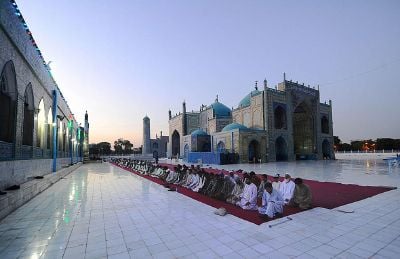
Tarawih (Arabic: تراويح) literally "rest and relaxation," are extra nightly prayers performed during the month of Ramadan. It may involve reading one Juz' (Arabic: جُزْء, or section of the Quran. Unlike the five daily salat ritual prayers which are fard (obligatory) under Islamic law, tarawih prayers are considered optional (sunnah “habitual practice”).[23]
Recitation of the Quran
Muslims are encouraged to read the entire Quran, which comprises thirty juz' (sections), over the thirty days of Ramadan. Some Muslims incorporate a recitation of one juz' into each of the thirty tarawih sessions observed during the month.[24]
Zakat al-Fitr
Zakat al-Fitr or Sadaqat al-Fitr is a charitable obligation, mandatory for all Muslims — male or female, minor or adult as long as they have the means to do so — that is traditionally paid before the end of Ramadan.[25] The collected amount is used to pay the zakat collectors and to the poor so that they may be provided with a means to celebrate Eid al-Fitr (the festival of breaking the fast) following Ramadan.
Zakat al-Fitr, the special contribution during Ramadan, is a fixed amount assessed per person, while Zakat, or Zakat al-mal ("zakat on wealth"), one of the Five Pillars of Islam, zakat is a religious duty for all Muslims, is based on personal income and property.
Cultural practices
In some Islamic countries, lights are strung up in public squares and across city streets, a tradition believed to have originated during the Fatimid Caliphate, where the rule of Caliph al-Mu'izz li-Din Allah was acclaimed by people holding lanterns.[26]
In Indonesia, the iftar meal is announced every evening by striking the bedug, a giant drum, in the mosque. The bedug is also part of the Eid al-Fitr celebrations at the end of Ramadan. Starting on the evening of the last day of Ramadan and continuing throughout the night and into the following day, the bedug are beaten for the Takbiran prayers and during parades and celebrations of Eid al-Fitr.[27] On the island of Java, many believers bathe in holy springs to prepare for fasting, a ritual known as Padusan.[28] In the Chinese-influenced capital city of Jakarta, firecrackers are widely used to celebrate Ramadan, although they are officially illegal.[29] Certain kinds of food are especially popular during Ramadan, such as large beef or buffalo in Aceh and snails in Central Java.[30]
During Ramadan in countries in the Middle East, such as Egypt, Syria, Sudan, Saudi Arabia, Jordan, Pakistan, and Palestine, a Mesaharati beats a drum to wake people up to eat the suhoor meal and dawn prayer.[31] Similarly, in Indonesia and nearby countries in Southeast Asia, a slit drum known as a kentongan is used to wake households up for the pre-dawn meal.
|
Observance
Fasting from sunrise to sunset is fard (obligatory) for all adult Muslims who are not acutely or chronically ill, traveling, elderly, pregnant, breastfeeding, diabetic, or menstruating. A predawn meal, suhoor, and nightly feast, iftar, that breaks the fast, are part of the schedule of fasting. There is widespread observance, with the majority (over 90 percent) of Muslims reporting that they fast during Ramadan.[32]
The spiritual rewards (thawab) of fasting are believed to be multiplied during Ramadan. Accordingly, Muslims refrain not only from food and drink, but also tobacco products, sexual relations, and sinful behavior,[33] devoting themselves instead to salat (prayer), recitation of the Quran, and the performance of charitable deeds.
Ramadan in polar regions
The length of the dawn to sunset time varies in different parts of the world according to summer or winter solstices of the Sun. Most Muslims fast for eleven to sixteen hours during Ramadan. However, in polar regions, the period between dawn and sunset may exceed twenty-two hours in summer. For example, in 2014, Muslims in Reykjavik, Iceland, and Trondheim, Norway, fasted almost twenty-two hours, while Muslims in Sydney, Australia, fasted for only about eleven hours. In areas characterized by continuous night or day, some Muslims follow the fasting schedule observed in the nearest city that experiences sunrise and sunset, while others follow Mecca time.[34]
Ramadan in Earth orbit
Muslim astronauts in space schedule religious practices around the time zone of their last location on Earth. For example, an astronaut from Malaysia launching from the Kennedy Space Center in Florida would align their fast according to sunrise and sunset in Eastern Standard Time. This includes times for daily prayers, as well as sunset and sunrise for Ramadan.[35] Astronauts may also delay their Ramadan observance until they return to earth, if this is more practical.
Employment during Ramadan
Muslims continue to work during Ramadan; however, in some Islamic countries, such as Oman, Lebanon, Bahrain, and Kuwait, working hours may be shortened. It is often recommended that working Muslims inform their employers if they are fasting, given the potential for the observance to impact performance at work.[36] The extent to which Ramadan observers are protected by religious accommodation varies by country. Policies putting them at a disadvantage compared to other employees have been met with discrimination claims.[37]
Health
Ramadan fasting is safe for healthy people, but those with medical conditions are advised to seek medical advice if they encounter health problems before or during fasting.
Ramadan fasting can be potentially hazardous for pregnant women as it is associated with risks of inducing labor and causing gestational diabetes. It is permissible to not fast if it threatens the life of the woman or the child.
Notes
- ↑ 1.0 1.1 Malcolm Clark, Islam For Dummies (John Wiley & Sons, 2019, ISBN 978-1119642978).
- ↑ 2.0 2.1 Ramadan 2022 Calendar Date. Retrieved May 3, 2022.
- ↑ Ramadan Etymology Online. Retrieved May 3, 2022.
- ↑ 4.0 4.1 AbdAllah-Muhammad Bukhari-Ibn-Ismail, Sahih Bukhari – Book 031 (The Book of Fasting), Hadith 124 Hadith Collection. Retrieved May 3, 2022.
- ↑ Abul-Hussain Muslim-Ibn-Habaj, Sahih Muslim – Book 006 (The Book of Fasting), Hadith 2378 Hadith Collection. Retrieved May 3, 2022.
- ↑ Rafig Y. Aliyev, Loud Thoughts on Religion (Trafford Publishing, 2013, ISBN 978-1490705217).
- ↑ Mahmood Bin Ahmad Ad-Dausaree, The Magnificence of Quran (Darussalam Publishers, 2015, ISBN 978-9960980119).
- ↑ Neal Robinson, Islam: A Concise Introduction (Georgetown University Press, 1999, ISBN 978-0878402243).
- ↑ Bombay Tract and Book Society, Life of Mohammed (Wentworth Press, 2019, ISBN 978-0353880443).
- ↑ Deborah Heiligman, Holidays Around the World: Celebrate Ramadan and Eid al-Fitr with Praying, Fasting, and Charity (National Geographic Children's Books, 2006, ISBN 978-0792259268).
- ↑ Adam Yosef, Why Ramadan brings us together BBC, August 25, 2009. Retrieved May 2, 20203, 2022.
- ↑ Thomas Erdbrink, Help for the Heavy at Ramadan Washington Post, September 28, 2008. Retrieved May 3, 2022.
- ↑ Quran 2:184
- ↑ Bukhari: Book 3: Vol. 31: Hadith 146 (Fasting).
- ↑ Abul-Hussain Muslim-Ibn-Habaj, Sahih Muslim – Book 006 (The Book of Fasting), Hadith 2415 Hadith Collection. Retrieved May 3, 2022.
- ↑ John L. Esposito, The Oxford dictionary of Islam (Oxford University Press, 2004, ISBN 978-0195125597).
- ↑ Melissa Fletcher Stoeltje, Muslims fast and feast as Ramadan begins San Antonio Express-News, August 22, 2009. Retrieved May 3, 2022.
- ↑ Nour El-Zibdeh, Understanding Muslim Fasting Practices Today's Dietitian, 11(8) (August 2009): 56. Retrieved May 3, 2022.
- ↑ Darra Goldstein (ed.), The Oxford Companion to Sugar and Sweets (Oxford University Press, 2015, ISBN 978-0199313396).
- ↑ Faye and Yakir Levy, Ramadan's high note is often a dip Los Angeles Times, July 21, 2012. Retrieved May 3, 2022.
- ↑ Abu Dhabi's Grand Mosque feeds 30,000 during Ramadan Euro News, May 10, 2019. Retrieved May 3, 2022.
- ↑ Gisoo Misha Ahmadi, Iran's Mashhad hosts biggest "Iftar" in world Iran Mirror, June 15, 2016. Retrieved May 3, 2022.
- ↑ Shaykh Furhan Zubairi, Guidance For Praying Tarawih At Home Muslim Matters. Retrieved May 3, 2022.
- ↑ Huda, All About Ramadan, Islam's Holy Month Learn Religions, April 8, 2021. Retrieved May 3, 2022.
- ↑ Sadaqat-ul-Fitr Hidaya Foundation. Retrieved May 3, 2022.
- ↑ Noura Anwar, Two Cultural Symbols of Ramadan: Lantern and Qatayef Arab America, June 7, 2017. Retrieved May 3, 2022.
- ↑ Ramadan and Lebaran in Indonesia Living in Indonesia, November 7, 2019. Retrieved May 3, 2022.
- ↑ This Is How Indonesia Welcomes Ramadan Jakarta Globe, May 4, 2019. Retrieved May 3, 2022.
- ↑ Calvin Sims, Jakarta Journal; It's Ramadan. School Is Out. Quick, the Earplugs! The New York Times, December 19, 2000. Retrieved May 3, 2022.
- ↑ Agus Maryono and Severianus Endi, On the hunt for delectable snacks The Jakarta Post, July 7, 2014. Retrieved May 3, 2022.
- ↑ Jihad Abaza, Meet Cairo’s mesaharati: The spirit of Ramadan beats to a woman’s drums Middle East Eye, June 11, 2018. Retrieved May 3, 2022.
- ↑ Fatima Ghani, Most Muslims say they fast during Ramadan Pew Research Center, July 9, 2013. Retrieved May 3, 2022.
- ↑ Ed Hotaling, Islam Without Illusions: Its Past, Its Present, and Its Challenge for the Future (Syracuse University Press, 2003, ISBN 0815607660).
- ↑ Ashifa Kassam, Arctic Ramadan: fasting in land of midnight sun comes with a challenge The Guardian, July 3, 2016. Retrieved May 3, 2022.
- ↑ Rachel Donadio, Interstellar Ramadan The New York Times Magazine, December 9, 2007. Retrieved May 3, 2022.
- ↑ Saiyyidah Zaidi, The Working Muslim in Ramadan Working Muslim, 2011. Retrieved May 3, 2022.
- ↑ Brett Snider, Reasonable Accommodations for Ramadan? Lessons From 2 EEOC Cases FindLaw, June 27, 2014. Retrieved May 3, 2022.
ReferencesISBN links support NWE through referral fees
- Ad-Dausaree, Mahmood Bin Ahmad. The Magnificence of Quran. Darussalam Publishers, 2015. ISBN 978-9960980119
- Aliyev, Rafig Y. Loud Thoughts on Religion: A Version of the System Study of Religion. Useful Lessons for Everybody. Trafford Publishing, 2013. ISBN 978-1490705217
- Bombay Tract and Book Society. Life of Mohammed. Wentworth Press, 2019. ISBN 978-0353880443)
- Clark, Malcolm. Islam For Dummies. John Wiley & Sons, 2019. ISBN 978-1119642978
- Esposito, John L. The Oxford dictionary of Islam. Oxford University Press, 2004. ISBN 978-0195125597
- Heiligman, Deborah. Holidays Around the World: Celebrate Ramadan and Eid al-Fitr with Praying, Fasting, and Charity. National Geographic Children's Books, 2006. ISBN 978-0792259268
- Hotaling, Ed. Islam Without Illusions: Its Past, Its Present, and Its Challenge for the Future. Syracuse University Press, 2003. ISBN 0815607660
- Robinson, Neal. Islam: A Concise Introduction. Georgetown University Press, 1999. ISBN 978-0878402243
External links
All links retrieved December 7, 2022.
- Guide to Ramadhan
- Celebrate Ramadan
- Ramadan Information Sheet
- Ramadan The Practice of Fasting
- What is Eid and when is it?
Credits
New World Encyclopedia writers and editors rewrote and completed the Wikipedia article in accordance with New World Encyclopedia standards. This article abides by terms of the Creative Commons CC-by-sa 3.0 License (CC-by-sa), which may be used and disseminated with proper attribution. Credit is due under the terms of this license that can reference both the New World Encyclopedia contributors and the selfless volunteer contributors of the Wikimedia Foundation. To cite this article click here for a list of acceptable citing formats.The history of earlier contributions by wikipedians is accessible to researchers here:
The history of this article since it was imported to New World Encyclopedia:
Note: Some restrictions may apply to use of individual images which are separately licensed.
